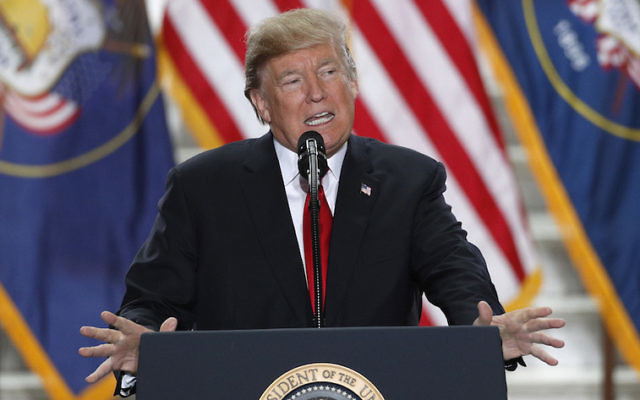Trump to recognise Jerusalem, move embassy
Donald Trump is being applauded by Israel and lambasted by Palestinians, as he prepares to recognise Jerusalem as the capital of Israel and progress plans to move the US embassy there.
DONALD Trump is being applauded by Israel and lambasted by Palestinians, as he prepares to recognise Jerusalem as the capital of Israel and progress plans to move the US embassy there.
Trump phoned Middle East leaders on Tuesday, to tell them that he plans to relocate the American Embassy from Tel Aviv to Jerusalem — recommitting himself to part of his campaign agenda which many believed he had shelved now that he is in office.
The Arab figures who he phoned — Palestinian President Mahmoud Abbas, Egyptian President Abdel-Fattah al-Sissi, Saudi King Salman and Jordan’s King Abdullah — responded negatively and warned against relocating the embassy. Only Benjamin Netanyahu of Israel was pleased.
Trump didn’t specify a timescale for the controversial move, and isn’t expected to make concrete plans for at least six months, but the Palestinians are already trying to build an alliance of international powers, including Russia and the Vatican, to dissuade Trump.
The US recommitment to the embassy move is thought to have been a warm-up for a broader announcement that he thought poised to make, recognising Jerusalem — or at least part of the city — as Israel’s capital.
As The AJN went to press, Israelis and Palestinians were frantically lobbying the White House and using every possible means to influence American officials to either stay committed to the recognition plan or scupper it.
The top Palestinian representative in Washington, Husam Zomlot, claimed that recognition could be the “kiss of death” for hopes of peace based on a two-state solution, and the senior Palestinian official Nibril Shaath said that Trump would kill his chances of making Israeli-Palestinian peace.
“There is no deal that begins with the destruction of the two-state solution,” he said. The Arab League has spoken of “a dangerous measure that would have repercussions.”
For Jerusalem’s mayor Nir Barkat, recognising his city as Israel’s capital will send a “very clear message to the world that the United States stands with the Jewish people and the State of Israel.”
Barkat urged Trump to go beyond recognising Jerusalem, and keep his pledge to move the embassy.
Trump is expected to recognise some, but not all, of Jerusalem as Israel’s capital.
He has been coming under heavy pressure from senior staff in the State Department.
“The impending Jerusalem announcement has me very worried about the possibility of violent responses that could affect embassies,” a State Department official told Politico. “I hope I’m wrong.” American embassies worldwide are believed to be on heightened alert.
Israel’s Defence Minister Avigdor Lieberman said that he was looking forward to celebrating the announcement and dismissed warnings of violence, saying that Israel knows how to “deal with all ramifications.”
The leader of the centrist Yesh Atid party said that he, too, is enthusiastic about US recognition for Jerusalem.
But some voices on the Israeli left were very critical. By recognising Jerusalem as capital the US administration would “relinquish any claims to serving as an honest broker between the parties, likely derailing a peace process before it could even get started,” the dovish Jerusalem-based organisation Ir Amim argued.
It’s unclear why Trump has put recognition of Jerusalem on the agenda right now, but there is speculation that it could be related to a plan for Israeli-Palestinian peace that is reportedly being formulated by the White House and Saudi Arabia.
Trump’s focus on Jerusalem recognition could give him leverage to get both sides to comply, analysts are suggesting.
“Firstly, this recognition is a way for Trump to say he’s doing something that he promised,” Jonathan Rynhold, a Bar Ilan University expert on US-Israel relations, told The AJN.
“He feels that the Republican base and Jewish voters who support him want to see that he’s doing something for Israel. it’s important to him that he’s seen as pro-Israel.”
Beyond this, said Rynhold, “if he does this, it gives him leverage with Netanyahu. Benjamin Netanyahu is always concerned how the Israeli public view him as a leader and the Israeli public thinks relation with US is second only to Israel’s security.”
Netanyahu could disregard requests from Barack Obama because he was widely seen as giving Israel a hard time, but the more pro-Israel a President is perceived, the more the Israeli public expects their PM to agree to his requests, “if a President is seen as pro-Israel and thePM says no to him on request to freeze settlements or make other concessions that aren’t against security interest its going to look very bad not only in America but also to Israelis,” said Rynhold, suggesting that Trump will be able to use this leverage to get Netanyahu to take part in a peace process.
Palestinians are understood to be furious about the emerging US-Saudi peace plan, as it is thought to leave most settlements in place, consist of areas that aren’t all connected, not include a “right of return” for refugees and their descendants, and not make East Jerusalem into the Palestinian capital.
Some Palestinian sources say that their political leaders would not negotiate based on such a plan, but there are suggestions that Trump’s leverage on Jerusalem could get them to the negotiating table.
Trump could make it known to the Palestinians that if they cooperate with his peace plans, he’ll cancel plans to move the embassy, and if they don’t he will recognise all of Jerusalem as Israel’s capital.
At least for now, however, the Palestinian leadership’s reaction to Trump’s Jerusalem plans is pure anger.
Hanan Ashwari, a senior Palestinian Authority politician, claimed on Tuesday: “President Trump seems to be hell-bent on annihilating the chances of peace and destroying the stability and security of the entire region and beyond.”
NATHAN JEFFAY


comments